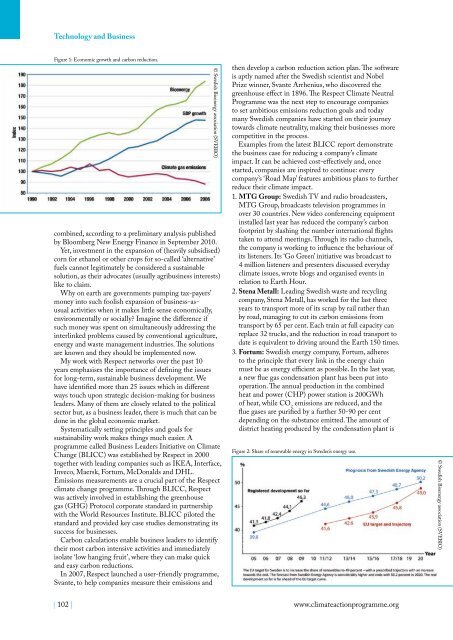Climate Action 2010-2011
Create successful ePaper yourself
Turn your PDF publications into a flip-book with our unique Google optimized e-Paper software.
Technology and Business<br />
Figure 1: Economic growth and carbon reduction.<br />
combined, according to a preliminary analysis published<br />
by Bloomberg New Energy Finance in September <strong>2010</strong>.<br />
Yet, investment in the expansion of (heavily subsidised)<br />
corn for ethanol or other crops for so-called ‘alternative’<br />
fuels cannot legitimately be considered a sustainable<br />
solution, as their advocates (usually agribusiness interests)<br />
like to claim.<br />
Why on earth are governments pumping tax-payers’<br />
money into such foolish expansion of business-asusual<br />
activities when it makes little sense economically,<br />
environmentally or socially? Imagine the difference if<br />
such money was spent on simultaneously addressing the<br />
interlinked problems caused by conventional agriculture,<br />
energy and waste management industries. The solutions<br />
are known and they should be implemented now.<br />
My work with Respect networks over the past 10<br />
years emphasises the importance of defining the issues<br />
for long-term, sustainable business development. We<br />
have identified more than 25 issues which in different<br />
ways touch upon strategic decision-making for business<br />
leaders. Many of them are closely related to the political<br />
sector but, as a business leader, there is much that can be<br />
done in the global economic market.<br />
Systematically setting principles and goals for<br />
sustainability work makes things much easier. A<br />
programme called Business Leaders Initiative on <strong>Climate</strong><br />
Change (BLICC) was established by Respect in 2000<br />
together with leading companies such as IKEA, Interface,<br />
Inveco, Maersk, Fortum, McDonalds and DHL.<br />
Emissions measurements are a crucial part of the Respect<br />
climate change programme. Through BLICC, Respect<br />
was actively involved in establishing the greenhouse<br />
gas (GHG) Protocol corporate standard in partnership<br />
with the World Resources Institute. BLICC piloted the<br />
standard and provided key case studies demonstrating its<br />
success for businesses.<br />
Carbon calculations enable business leaders to identify<br />
their most carbon intensive activities and immediately<br />
isolate ‘low hanging fruit’, where they can make quick<br />
and easy carbon reductions.<br />
In 2007, Respect launched a user-friendly programme,<br />
Svante, to help companies measure their emissions and<br />
© Swedish Bioenergy association (SVEBIO)<br />
then develop a carbon reduction action plan. The software<br />
is aptly named after the Swedish scientist and Nobel<br />
Prize winner, Svante Arrhenius, who discovered the<br />
greenhouse effect in 1896. The Respect <strong>Climate</strong> Neutral<br />
Programme was the next step to encourage companies<br />
to set ambitious emissions reduction goals and today<br />
many Swedish companies have started on their journey<br />
towards climate neutrality, making their businesses more<br />
competitive in the process.<br />
Examples from the latest BLICC report demonstrate<br />
the business case for reducing a company’s climate<br />
impact. It can be achieved cost-effectively and, once<br />
started, companies are inspired to continue: every<br />
company’s ‘Road Map’ features ambitious plans to further<br />
reduce their climate impact.<br />
1. MTG Group: Swedish TV and radio broadcasters,<br />
MTG Group, broadcasts television programmes in<br />
over 30 countries. New video conferencing equipment<br />
installed last year has reduced the company’s carbon<br />
footprint by slashing the number international flights<br />
taken to attend meetings. Through its radio channels,<br />
the company is working to influence the behaviour of<br />
its listeners. Its ‘Go Green’ initiative was broadcast to<br />
4 million listeners and presenters discussed everyday<br />
climate issues, wrote blogs and organised events in<br />
relation to Earth Hour.<br />
2. Stena Metall: Leading Swedish waste and recycling<br />
company, Stena Metall, has worked for the last three<br />
years to transport more of its scrap by rail rather than<br />
by road, managing to cut its carbon emissions from<br />
transport by 65 per cent. Each train at full capacity can<br />
replace 32 trucks, and the reduction in road transport to<br />
date is equivalent to driving around the Earth 150 times.<br />
3. Fortum: Swedish energy company, Fortum, adheres<br />
to the principle that every link in the energy chain<br />
must be as energy efficient as possible. In the last year,<br />
a new flue gas condensation plant has been put into<br />
operation. The annual production in the combined<br />
heat and power (CHP) power station is 200GWh<br />
of heat, while CO 2<br />
emissions are reduced, and the<br />
flue gases are purified by a further 50-90 per cent<br />
depending on the substance emitted. The amount of<br />
district heating produced by the condensation plant is<br />
Figure 2: Share of renewable energy in Sweden’s energy use.<br />
© Swedish Bioenergy association (SVEBIO)<br />
| 102 |<br />
www.climateactionprogramme.org












